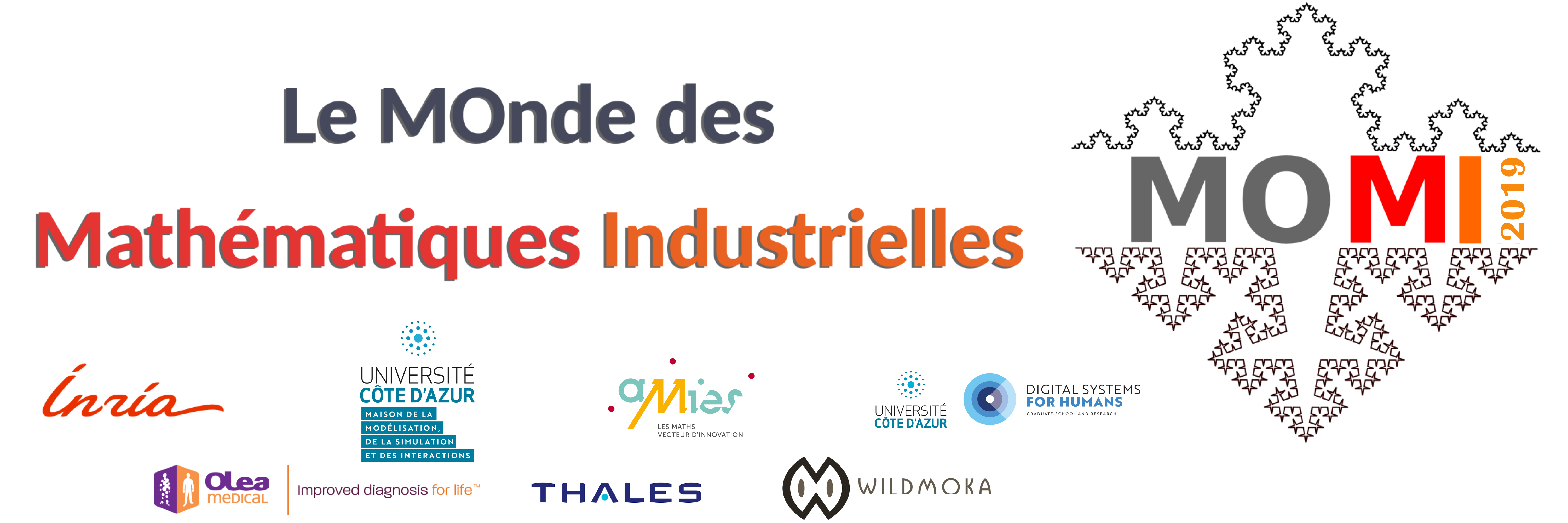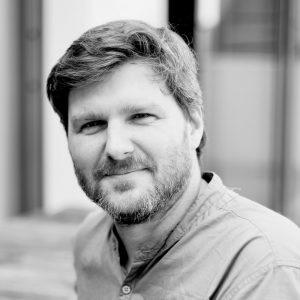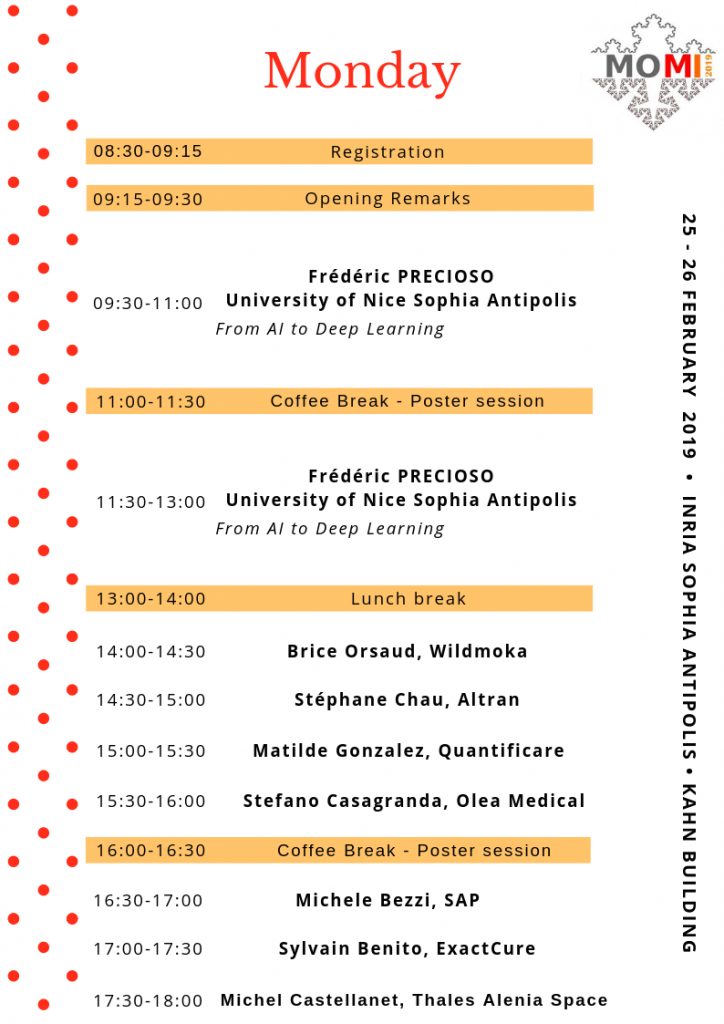We are very pleased to announce the implementation of “The World of Industrial Mathematics – Le Monde des Mathématiques Industrielles” (MOMI2019), a two day workshop on Applied and Industrial Mathematics. The topic of this edition will be “Big Data and Machine Learning“.
THE REGISTRATION IS CLOSED.
Workshop
MOMI 2019 is a two-day workshop on applied and industrial mathematics that took place on the 25th and 26th of February, 2019. The workshop will place at the Inria Sophia Antipolis-Mediteranée research center and is targeted at graduate students, early career and senior researchers interested in mathematics and the application of it to the industrial world.
A company fair to allow the direct exchange with companies will be also set up.
In the course of the workshop, participants will have the opportunity to interact and exchange ideas, during the coffee/lunch breaks. Moreover, a dinner will take place at the restaurant Le Transat in Antibes on the 25th of February and it will be the chance to further explore common research interests and the possibility of future collaborations, all while enjoying a delightful dinner in a cozy atmosphere.
Have a look at the program for more details and please note that a particular effort has been paid to welcome you to participate by offering a free registration including admission to all seminars, all lunches and refreshments, and the gala dinner.
Organizers
Isa Costantini – PhD Student, ATHENA, Inria
Ali Elarif – PhD Student, CASTOR, Inria
Michael Fell – PhD Student, WIMMICS, Inria
Evgenia Kartsaki – PhD Student, BIOVISION, Inria
Selma Souihel – PhD Student, BIOVISION, Inria
Sponsors
MOMI2019 is a project supported and financed by Inria, by the Maison de la Modélisation, de la Simulation et des Interactions – MSI of Université Côte d’Azur, by the Graduate School “Digital Systems for Humans” (EUR project ANR-17-EURE-004 from the “Programme Investissements d’Avenir”), by the Agence pour les Mathématiques en Interaction avec l’Entreprise et la Société (AMIES) and by the companies OLEA Medical, Thales Alenia Space and Wildmoka.
Doctoral formation credits/hours
Doctoral schools (ED-STIC and SFA) will give credits for participating at MOMI2019. Check it here!
Speakers
Keynote speakers
Full Professor at the Engineering school Polytech’Nice
Member of the SPARKS team of the I3S UMR 7271 CNRS-UNS laboratory
Head of MinD research group in Machine Learning and Data Mining
Day: Monday, 25th of February 2019
Title:
From AI to Deep Learning
Abstract:
How can Facebook instantly recognize your family and friends? How can cameras and mobile phones automatically detect a smile? Have to take an autonomous car for a 100km trip? This conference will try to help grasping the concept of artificial intelligence, will introduce some of the success stories of Machine Learning presenting face detection with boosting, human action recognition with random forests. From artificial neural networks, we will open up to the classic deep network architectures. Some of our own recent contributions on active learning for deep learning, deep network understanding or bio-inspired optimization will be presented.
Short Bio
Since 2011, Frederic Precioso is Professor at the University of Nice Sophia Antipolis (UNS), lecturer at the École d’ingénieur Polytech’Nice Sophia, member of the SPARKS (Scalable and Pervasive softwARe and Knowledge Systems) team of the I3S UMR 7271 CNRS-UNS laboratory. He is responsible of the research group MinD (Mining Data). His main research interests are: (i) Understanding Deep Learning (Active Learning, Bio-inspired optimization and interpretation, Deep Natural Language Processing vs Statistical Text Analysis, Deep Learning and Knowledge, Embedded Deep Learning); (ii) Understanding Inhomogeneity (Semantics from 3D, Semantics from video and from multimedia data, Semantics from the gaze, Semantics in the time series); (iii) Meta-Learning/Meta-Mining (AI on-demand Platform, Multi-Consensus Clustering, Hybridization Machine Learning – Evolutionary algorithms). Since September 2018, he is Scientific and Program Officer for the National Research Agency (ANR) for State Investment Programmes Division and Digital Technology and Mathematics Dept.
Professor of Computer Science at the University of Lille
Day: Tuesday, 26th of February 2019
Title:
AI learns to act
Abstract:
The main objective of this talk is to present the problem of sequentially making decision in an uncertain world. This two most well-known problems in this field are the reinforcement learning problem and the bandit problems: both problems will be presented. To achieve this goal, I will also briefly introduce the necessary elements of supervised learning. Overall, I hope to convey an up to date overview of the algorithms and their application on real world problems; I also wish to discuss what can be expected in the (near) future of machine learning.
Short Bio
Philippe Preux is a professor in Computer Science at the Université de Lille since 2003. He does his research in the UMR CRIStAL and Inria-Lille. He has been doing research in AI since around 1992, first about genetic algorithms, then slowly drifting towards machine learning and reinforcement learning. He has created the research group SequeL at Inria in 2006, focusing on sequential decision making under uncertainty. His research is mostly about the design of learning algorithms; he also works in collaboration with researchers in various companies.
Associate Professor of the Department of Computer Science at the University of Crete
Co-founder of Gnosis Data Analysis PC
Day: Tuesday, 26th of February 2019
Title:
Automated Machine Learning for Biomedicine
Abstract:
Available data are exploding, presenting new opportunities for science, understanding the system under study, and creating diagnostic and predictive models. However, each data analysis project requires significant human time and effort, as well as deep knowledge and expertise in data analytics. A new sub-field of machine learning is now emerging trying to fully automate the end-to-end process of the analysis, increase the productivity of experts, and democratize analyses to non-experts called automated machine learning or AutoML.
In this talk, we’ll present the challenges of AutoML, delve into some proposed solutions, and present our AutoML tool called Just Add Data Bio or JAD Bio. While the talk is generally addressed to people interested in machine learning, data science, and advanced statistical
analysis, the examples and presentation is centered around the analysis of biological and biomedical data.
Short Bio
Ioannis Tsamardinos, Ph.D., is a Professor at the Computer Science Department of University of Crete and co-founder of Gnosis Data Analysis PC, a University start-up. He obtained his Ph.D. from the Intelligent Systems Program at the University of Pittsburgh in 2001. He then worked as Assistant Professor at the Department of Biomedical Informatics at Vanderbilt University until 2006 when he returned to Greece. Prof. Tsamardinos’ main research directions include machine learning, bioinformatics, and artificial intelligence. More specifically his work emphasizes feature selection, causal discovery, and automation of machine learning.
Program
Download the pdf of the program here.
Participants will have the opportunity to present their work during the poster session.
Poster submission is now CLOSED.
The list of the posters can be found here.












Prof. Tsamardinos has over 100 publications in international journals, conferences, and books. He has participated in several national, EU, and US-funded research projects. Distinctions with colleagues and students a Gold Medal in the Student Paper Competition in MEDINFO 2004, the Outstanding Student Paper Award in AIPS 2000, the NASA Group Achievement Award, a Google “classic” paper on AI for 2006 and others. Prof. Tsamardinos is a regular reviewer for all major Machine Learning and AI conferences (e.g., UAI, ICML, NIPS, KDD, AAAI, IJCAI), leading Machine Learning journals (e.g., JMLR, TKDE, PAMI), and bioinformatics journals (e.g., Bioinformatics Journal, BMC Bioinformatics). Statistics on recognition of work include more than 6000 citations (600+ a year), and h-index of 32 (as estimated by Google Scholar). Ioannis has been awarded the European and Greek national grants of excellence, the ERC Consolidator and the ARISTEIA II grants respectively.